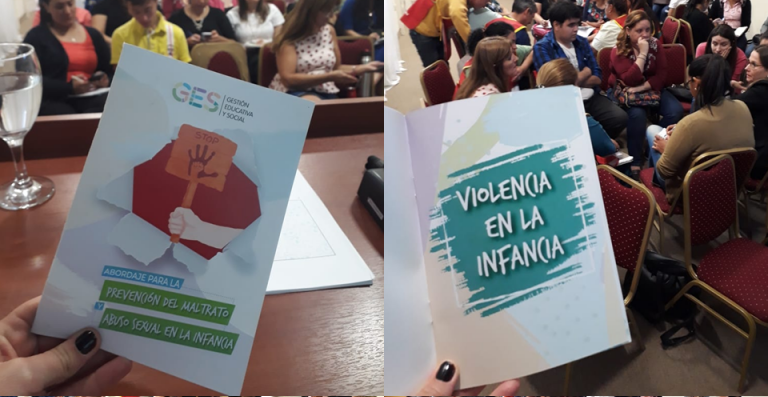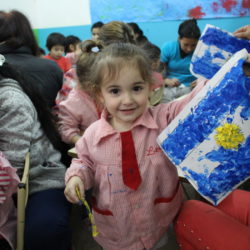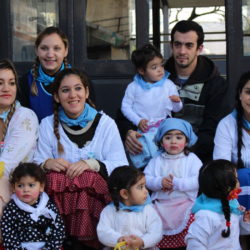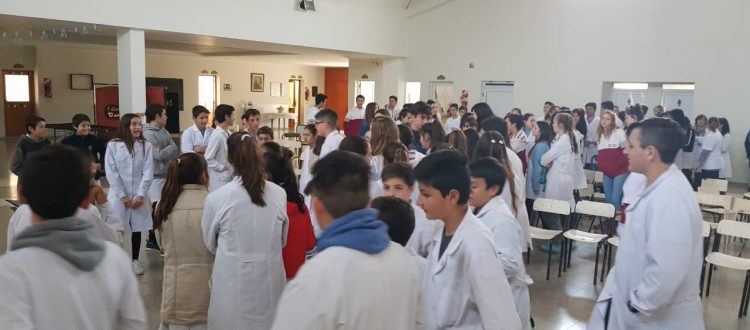Programs
- Early Childhood Centers
- School Support Centers
Objectives
The EARLY CHILDHOOD CENTERS promoted by the GCBA (Basque Autonomous City Government) aim to “guarantee the healthy growth and development of children from 45 days to 3 years of age in situations of social vulnerability in the City of Buenos Aires, in order to promote and protect their rights.”
“Gestitos”
Since 2012, our organization has been operating under the Associated Management modality, which provides for the joint participation of Civil Society Organizations and the Government of the Autonomous City of Buenos Aires, with the EARLY CHILDHOOD CENTER PROGRAM of the Civil Society Strengthening Directorate.
Under this framework, we inaugurated our “GESTITOS” Early Childhood Center, located in the Mataderos neighborhood, adhering to the guiding principles of the Convention on the Rights of the Child, the National Constitution, the Constitution of the Autonomous City of Buenos Aires, Law No. 26,061, Law No. 26,233, and Law No. 114.
“Casitas”
A year later, we inaugurated the second “CASITAS” Early Childhood Center in the Constitución neighborhood. In January 2017, the largest of our “IRQICHAY” Early Childhood Centers opened under the same legal framework and in compliance with the general objectives of the EARLY CHILDHOOD Program, which are:
Providing the basic elements to meet the physiological, emotional, psychomotor, play, recreational, and socialization needs for the healthy development of children and their environment. Create a space conducive to early stimulation for children aged 45 days to 2 years, inclusive, and for the development and acquisition of habits for children aged 3 to 4 years.
Provide the necessary support and assistance to parents so they can adequately assume their responsibilities and obligations in the upbringing and development of their children; creating conditions for active participation that strengthen family ties.
Provide information and support to pregnant women in situations of social vulnerability on fundamental aspects of pregnancy, childbirth, and the first months of caring for their child, with a view to strengthening the bond between mother and child.
What activities are carried out?
In all EARLY CHILDHOOD CENTERS, adhering to the Program Regulations, we work full-time (8 hours) and provide comprehensive care to children from 45 days to 3 years of age through the following services:
Food and nutritional care: breakfast, lunch, and afternoon snack for children who attend the Centers daily, ensuring adequate and healthy nutrition as an essential requirement for their comprehensive development.
Health prevention and promotion activities are provided through workshops and training sessions for children and their families. These activities are also provided to pregnant women.
Early stimulation and training through games, physical exercises, and recreational activities, thus seeking to promote the development of children’s psychophysical, cognitive, communicative, and social abilities and skills.
Training through participatory workshops for families aimed at providing them with the information and support necessary to facilitate the upbringing of their children, strengthening the bond between both parties. This service is also provided to pregnant women.
Our Team and Hours
The Early Childhood Centers operate Monday through Friday, with a full 8-hour day, and all services are provided free of charge.
Each Early Childhood Center has a core team consisting of:
• Director (Center Representative)
• Early Childhood Education Teachers and Classroom Assistants in each classroom throughout the day
• Interdisciplinary Technical Team (psychomotor therapist, educational psychologist, and social worker)
• Kitchen and maintenance staff
Currently, 180 children attend the CASITAS Early Childhood Center, 130 children attend the GESTITOS Early Childhood Center, and 200 children attend the IRQICHAY Early Childhood Center, for a total of more than 500 children in the Federal Capital.
What do we do?
Since 2013, our organization has been part of the SCHOOL SUPPORT NETWORK of the Ministry of Education of the Government of the City of Buenos Aires. This NETWORK is a program whose mission is to support the school journey of children, adolescents, and their families, promoting their retention in school.
The Network has 58 centers in all communes, which operate in community-based reference spaces, such as neighborhood clubs, parishes, and libraries.
At the School Support Centers, we provide academic support in all primary and secondary school subjects and work to ensure that each student acquires greater levels of autonomy as a learner.
Support Centers
School Support Centers for Children and Adolescents of G.E.S.
- Futbol Club Lugano (Primary and Secondary school students under 18) – Av. Lisandro de la Torre 4640 (Villa Lugano) – Tue and Thu 3:30 PM to 6:30 PM
- Casa Salesiana “San Antonio” (Primary and Secondary school students under 18) – México 4050 (Almagro) – Tue and Thu 5:00 PM to 8:00 PM
- Club Alvear (Primary and Secondary school students under 18) – José Rodo 4190 (Parque Avellaneda) – Mon and Wed 4:30 PM to 7:30 PM
- National House of the Future (adolescent and adult students in primary, secondary, and completion programs, ages 15 and older) – Av. Francisco Beiró 3945 (Villa Devoto) – Tue and Thu 5:00 PM to 8:00 PM
Currently, 45 people attend the Centers for Children and Adolescents per day, totaling 180 children, adolescents, and young adults per week.
To formalize registration, those under 18 years of age must come with their mother/father/legal guardian and bring a photocopy of the student’s ID, as well as a photocopy of their school report card.
Contact
GES School Support Center Coordinator: osantoscalvo@ges.org.ar
Community School Support Network: Phone 0800-444-2400, email redapoyoescolar@bue.edu.ar
Projects
- Addressing Problems of Childhood and Adolescence.
- Prevention of Gender Violence in a Context of Vulnerability
- Comprehensive Prevention of Addictions
- “Free Time” Program (SUMA Foundation)
Rationale
Aimed at men and women working on issues related to early childhood, childhood, and adolescence, for the second consecutive year, and with the support of the Directorate for Strengthening Civil Society, we are offering the Diploma in Addressing Issues in Early Childhood, Childhood, and Adolescence.
We generated this training project through research in which disciplines such as anthropology, developmental psychology, medicine, sociology, and education have demonstrated the fundamental importance of early childhood development in shaping intelligence, personality, and social behavior. In this sense, if young children do not receive the attention and care they need during these formative years, the consequences are cumulative and long-lasting.
The Training in Addressing Problems of Early Childhood, Childhood, and Adolescence seeks to be a space for reflection and training around socio-educational projects focused on the problems of Early Childhood, Childhood, and Adolescence. It seeks to train professionals, educators, and technicians with the capacity to address childhood and adolescent processes from the perspective of pedagogy, didactics, planning, and research, with a strong sense of social commitment and a clear scientific and humanistic vision that enables them to adequately respond to the educational needs of children and adolescents.
This training proposal aims to produce knowledge in response to new challenges for early childhood education, as well as to deepen the responses already acquired by the various professionals invited to participate.
Course Objectives
- To train individuals with a pedagogical and didactic foundation oriented toward the implementation of educational processes with a holistic approach, aimed at the well-being and development of human beings, enabling their being and doing in context.
- To train individuals capable of generating and managing innovative processes in education to build and implement alternatives that confront theory with life and reality, based on respect and faith in the capacity for change of human beings, and the recognition of the individuality, rhythm, and idiosyncrasies of each student.
- To develop educational themes from a perspective based on the paradigm of complexity and popular education, based on the analysis, interpretation, and transformation of the events that frame education and social development for children and adolescents.
Syllabus
- The historical-cultural construction of childhood.
- Childhood, culture, and subjectivities.
- Child development and learning.
- Children’s literature.
- Musical expression.
- Body and stage expression.
- Visual expression.
- Play in early childhood education.
- Early childhood educational institutions.
- Curriculum for early childhood education.
- General Psychology – Learning Psychology – Developmental Psychology – Neuropsychology – Social Psychology.
- Philosophy for Children.
- Educational Management – School and Curriculum.
- Educational Policies and Legislation.
Assessment Process and Methods
- Procedural and ongoing assessment.
- Individual indicators and group work according to guidelines.
- Commitment to and approval of final work on the topics covered.

Training of Preventive Promoters for Gender-Based Violence, with an emphasis on dating relationships and adolescents in situations of social vulnerability.
Rationale
Considering that in our country the context surrounding adolescents, especially young people living in poverty, is marked by violence, and that violence is clearly recognized as one of the most serious threats to the health and overall development of adolescents, we considered the creation of this preventive project.
This phenomenon, that of VIOLENCE, is not only local in scope but is a characteristic of Latin America and the Caribbean, where violence represents one of the leading causes of death among the population between 10 and 19 years of age (29% of homicides on the continent are adolescent victims).
Violence in adolescence is not limited to physical trauma or sexual assault, but also includes emotional and verbal abuse, threats, and other types of psychological abuse.[i]
Although the problem of adolescent violence affects both men and women, rates indicate that the majority of victims are women. “Almost all abusers are from the closest circle. Many of these victims are children, abused by their parents or adults who frequent them. And another large proportion are girls, adolescents, and young women abused by their partners. Specialists assert that dating violence increasingly involves younger perpetrators, and that the acts they commit are increasingly violent.”[ii]
Some data: 20% of cases of violence occur among young people between the ages of 19 and 25 / 50% of violent couples were in violent relationships.
Gender-based violence also plays a prominent role in youth violence and adolescent development, as it reflects a series of practices that develop within interpersonal relationships and can manifest itself through physical, psychological, economic, property-related, and symbolic violence. This is especially true in sectors where the culture of machismo accepts the use of violence to resolve conflicts as part of the social norm.
Thus, the development of masculinity and femininity is culturally rooted in the roles of each individual, and the path to becoming a man implies the use of verbal and physical violence, and conflict resolution occurs through fights and the exercise of power and control over women.
Objectives
The challenge, in this context, is how to support adolescents so they become more aware of their options in their emotional and sexual relationships, working on a true process of cultural transformation regarding masculinity and femininity, seeking new paths for the healthy development of sexuality, and addressing gender inequalities.
Awareness-raising and education are essential to ensure changes in relationships among adolescents. It is important to unlearn and deconstruct ideas and prejudices that support these types of relationships. It is necessary to “problematize” the problem of gender-based violence and sexuality, and together with adolescents, community leaders, families, and educators, we must engage in a profound reflection on the moral values and behavioral patterns we are practicing and teaching.
The project seeks to consider the sociocultural patterns that influence the development of gender-based violence among dating couples and adolescents, addressing them through three intervention axes:
- Awareness-raising (of the community in general and adolescents in particular)
- Education (workshops for adolescents, families, and social leaders)
- Orientation and Outreach
Initially, training and capacity building activities were conducted for people interested in identifying these behaviors in community intervention settings. The training for the promoters focused on topics related to:
- Sexuality and Adolescence
- Dating Violence
- Gender Violence
- Participatory Planning Strategies
The second phase involved the implementation of 10 workshops in neighborhoods with adolescents, families, and social leaders using the Popular Education methodology, addressing the content covered in the training with the promoters.
Finally, a Guidance Material for Adolescents was developed, which also included information on organizations and services within the City of Buenos Aires where they could receive assistance and support.
Contact
[i] (Pan American Health Organizatión, 2002b – World Health Organization 2002)
[ii] Mariana Iglesias, Hay víctimas cada vez más jóvenes y hechos más graves -Diario Clarín (01/03/2013)
COMPREHENSIVE ADDICTION PREVENTION PROGRAM
Addressing addictions in general and problematic drug use in particular represents a major challenge for various social actors, especially those responsible for supporting young people’s educational processes (state, school, family).
Drug use (legal and illegal) has grown in recent years not only in terms of the number of users, but also in the intensity of use and the horizontality and heterogeneity of the user sectors.
It is the responsibility of society as a whole to provide new responses to new challenges and to address the problem as something that does not lie outside, but within our institutions.
PROPOSED METHODOLOGY
The method of action for addiction prevention is based on and embraces the principles of community intervention.
Under this methodological perspective, various social agents, after appropriate training, are capable of carrying out preventive actions in different settings—school, family, work, etc.—and therefore become preventive agents.
The training activities are complemented by the design of programs aimed at different population groups, with the support and guidance of a multidisciplinary technical team in the implementation of the various preventive actions.
OBJECTIVES
Establish a participatory community space for reflection, training, and planning on addiction education and prevention:
- Recognize the prior knowledge and/or lack of knowledge on the topic and the feelings it generates in the teaching community.
- Develop and develop significant theoretical knowledge on the problem of addiction that responds to local and contextual realities.
- Recognize different intervention frameworks as a basis for developing a program proposal.
- Delineate agreed-upon lines of action.
Volunteering
Social volunteering as a participatory practice is a process that has been consolidated in recent years. However, it is necessary to take a further step along this path of participation by promoting and training volunteer leaders who can take on the role of leading change.
The Volunteer and Volunteer Leader Training Project, implemented in conjunction with the SUMA Foundation during 2014/15, seeks to strengthen the work of volunteer teams while promoting the practice of ACTIVE LEADERSHIP so that they can take on leadership roles and group coordination, thus energizing the experience, expanding the number of volunteers and community intervention spaces.
Project Focus
Volunteer Training
Implement a training course for GCBA volunteers who wish to assume leadership roles within the program.
Promote volunteers to assume leadership roles.
A selection of trained volunteers will be made, including those with leadership skills.
The Reason for the Proposal
The importance of the work that volunteers perform in social organizations requires them to be constantly equipped with knowledge and practical tools that allow them to be more efficient in their work. It is necessary to professionalize the volunteer practice and achieve coordinated work between volunteers working within the institutions and also between volunteers participating in the Program.
The lack of real empowerment of volunteers in the spaces where they participate in different activities limits, on the one hand, continuous monitoring of these activities and, on the other, the permanence of volunteers in the spaces where they participate.
We consider social volunteering a sustainable participatory practice that is consolidated year after year, but without focusing on identifying leaders or role models within the volunteer groups themselves. This action would strengthen ties, primarily between volunteers and, on the other hand, reconnect with the SUMA Foundation’s representatives, consolidating and strengthening them.
We believe it is necessary to further advance this path of participation by promoting and training volunteer leaders who can take the lead in bringing about change.
Activities
TRAINING
- Module 1 Verbal Survey: Strengths and Weaknesses of Volunteers in Their Current Roles. Introduction to Leadership. Groups vs. Individuals.
- Module 2 Effective Leadership: Personal Development: Bosses and Leaders / Subordinates and Collaborators.
- Module 3 Teamwork and the Work Team – Group Work.
- Module 4 Conflict Resolution – Mediation Techniques.
- Module 5 Assertive Communication – Critical Thinking and Creative Thinking.
- Module 6 Time Management: Participation, Leadership, and Empowerment.
- Module 7 Planning and Strategic Thinking.
- Module 8 Formulating Community Intervention Projects.
Cross-Functional Meetings
- May: Integrative Session 1: Attitudinal Changes Based on Training and Practice. The Volunteer as a Mediator in Experiential Learning Processes.
- June: Social Skills: Communication Skills (expression of ideas, expression of feelings, perception of reactions, handling opinions, forms of expression, clarification of doubts, balance, inquiry, and presentation).Listening Skills (fostering positive coexistence environments, listening time, prejudices, reading the body, understanding the feelings of others, handling discrepancies, giving efficient and timely responses). Observational Skills: Ability to give and receive criticism; the forms, positive and negative aspects. Behavioral Changes for Leaders.
- July: People in Vulnerable Situations: Children, Adolescents, and Women: Is Everything Related?
- August: Abuse, Violence, and Addictions
- September: Literacy: Strategies children use to read and write. Higher and lower-order processes involved in reading and writing. Proper names. Learning and memory. Spelling. Expanding the semantic field. Copying. Games and suggestions for intervention spaces. Different types of texts at different ages.
- October: Toys and game techniques workshop. Creative writing workshop: Is it a taught process?
- November: Resilience, Life Skills, and Health Promotion. 6 hours.
- December: Closing of the activity. Systematization of the practice. Integration of conclusions from the organization and participants.
More information
Teaching method: Theoretical and practical.
Course load and distribution: 80 hours, once a week for 2 hours, for 10 months.




